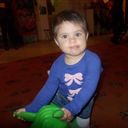Strugurasi de Sept-Oct 2011 *49*
Raspunsuri - Pagina 4


 anca_toma spune:
anca_toma spune:
bine promit ca ma interesez cu olita, sincer eu asa stiam , acum o sa vad sigur pana la 3 ani nu stam, dar si ce spuneti voi pare fff plauzibil.
, acum o sa vad sigur pana la 3 ani nu stam, dar si ce spuneti voi pare fff plauzibil.
Iancu nu are program fix, dar cam asta e cel mai des, cateodata il mai schimba si el dar nu fff des, e ca un ceas elvetian![]() ..
..
si noua ne-ar placea sa putem sa il lasam cu cineva in concediu, dar oricum nu avem pe nimeni, si speram sa fim tot fan titi![]() .
.
anca_toma mamica fericita a lui Iancu Matei (13.09.2011)


 ionelamaria spune:
ionelamaria spune:
Si pentru ca deja v-ati invatat cu mine.... urmeaza un "scurt"mesaj despre
PREMERGATOARE:
Question: Will a baby walker or jumper help my baby learn to walk?
Answer: No. In fact, studies have shown that babies who use a walker may actually learn to walk about a month later than those who don't. Walkers allow babies to move around before they are physically ready for it, which can cause unusual movement patterns and delayed muscle control.
Babies learn to walk in part by watching and understanding how their feet and legs move. If a walker has a tray, they can't see what's happening with their lower body and don't get the information they need about their motor development.
The American Academy of Pediatrics recommends against using walkers not only because they can discourage your child from learning to walk on his own, but also because they can be dangerous. Thousands of babies end up in emergency rooms and doctor's offices from falling down stairs or bumping into furniture while in a walker. Walkers can give parents a false impression that their babies are truly mobile and can control their actions. Some parents even leave their babies alone to navigate their way around the home in a walker.
Sursa:Babycenter.com
"Because a baby in a walker can get around easily, their urge to move across the floor is satisfied, so many aren't motivated to learn how to crawl or walk on their own. Walkers also strengthen the wrong muscles: the lower legs are used almost exclusively, while the upper legs and hips - used most when walking - remain relatively weak. "
"Children spend too much time confined to strollers, high chairs, baby seats, and walkers. This restricts the time available for free exploration of the natural environment, which is important for mental development."
The baby using a walker tends to be slow in reaching motor milestones such as sitting up, crawling, and walking and other milestones such as those involving memory, learning, and language skills
The researchers believe that use of newer-style walkers leads to physical developmental delays because the walkers' large trays restrict infants' view of their moving legs, depriving them of visual feedback that would help them learn how their bodies move through space. Baby walkers also prevent infants from exploring and grabbing at things around them, which is critical to their early mental development.
"Emmi Pikler - Pentru o dezvoltare libera
Pikler a condus un studiu in Ungaria referitor la capacitatea copiilor de a se dezvolta neuromotoriu fara interventia adultului, iar concluzia sa este ca interventia directa a adultilor in primele faze de dezvoltare a copilului, adica punerea copilului pe burta, punerea in sezut, in picioare, sustinerea copilului de manute in timpul mersului nu sunt conditii preliminarii in achizitia acestor etape de dezvoltare deoarece in conditii ambientale favorabile copilul reuseste singur, din proprie initiativa si punand in act miscari calitativ superioare, bine echilibrate sa se rostogoleasca, sa se puna in fund, sa mearga de-a busilea, sa umble.
Atunci cand copilul se misca din proprie initiativa se dezvolta si o constiinta a propriului corp, constiinta de sine. Copilul incepe sa-si formeze o perceptie a propriei eficiente, a propriei capacitati de insusire a elementelor mediului, in recunoasterea spatio-temporala a acestuia. Miscarea fizica reprezinta o parte importanta a activitatii unui copil in primii ani de viata. ca urmarea a unor studii cu caracter psihologic incepe sa se atribuie o tot mai mare importanta miscarilor active* in relatie cu formarea schemei corporee, constituirea functiilor orientative, formarea primelor notiuni abstracte si a primelor structuri a gandiri.
Rubinstein referindu-se la Szecsenov, scrise: perceptia spatiului si fixarea privirii se realizeaza inainte de toate datorita proprioceptorilor muschilor oculari, iar ulterior datorita multiplelor legaturi care se stabilesc in valutarea distantei dntre ochi si mana, picior. Astfel se realizeaza aproximarea timpului si spatiului in stabilirea relatiilor referitoare la apropierea obiectelor, inaltimea, traiectoria viteza acestora. Rezultatele experientelor efectuate demonstreaza ca pisicile dotate de aceleasi posibilitati vizive si perceptive, dar care nu au putut sa puna in act miscarea activa s-au dezvoltat divers comparativ cu cele carora le-a fost favorizata miscarea activa.
* miscarea activa este acea miscare pe care copilul din proprie initiativa, in maniera spontana o pune in act"
Mai multe despre cele scrise mai sus :http://www.attachmentparenting.ro/forum/viewtopic.php?f=14&t=734
[Case Western Reserve University -- Toolbar]
Contact: Susan Griffith, 216-368-1004, sbg4@po.cwru.edu
Posted 1/22/98
Study puts wheels on the case against the baby walker
Contrary to what some parents might think, baby walkers do not encourage a child to walk earlier or enhance cognitive abilities, according to a study conducted by a CWRU psychologist.
Just the opposite, says A. Carol Siegel, an experimental psychologist in the clinical respecialization certification program in psychology at Case Western Reserve University.
"Baby walkers are the No. 1 reason why infants under the age of 15 months visit emergency rooms."
-- Carol Siegel, CWRU psychologist
Siegel tracked the motor and mental skills of 109 infants between the ages of six and 15 months to see how baby walkers affected the onset of sitting, crawling, and walking -- considered the motor milestones in young children's lives.
She also looked at whether or not infants experience "an exploration deficit," since continued restriction to a walker after the onset of crawling limits free exploration of the environment, which facilitates mental development.
The findings add fuel to efforts to ban walkers, which have proven unsafe, said Siegel.
Citing medical studies, she reported, "Baby walkers are the No. 1 reason why infants under the age of 15 months visit emergency rooms."
Canada has banned the manufacture of walkers. Siegel said approximately 92 percent of U.S. households with infants have walkers. In 1993, U.S. infants suffered approximately 25,000 injuries from walker use.
"They offer a false sense of security. Even when parents are sitting right next to the child, there is absolutely no way they can keep a constant watch of their children," said Siegel, whose interest in baby walkers came from watching her young niece navigate in one.
"Children spend too much time confined to strollers, high chairs, baby seats, and walkers. This restricts the time available for free exploration of the natural environment, which is important for mental development."
Parents can encourage mental and motor development in young infants by providing supervised "free time" on a blanket on the floor with some toys within reach and others a few inches out of reach. Parents also can play with infants and gently roll them, help them sit, and practice balancing on their legs.
Half of the children in the research project did not use walkers. The other half were in walkers an average of 2.5 hours daily. Some babies used the walkers for as little as 30 minutes a day, and others for as long as 6.5 hours.
Siegel collaborated with Roger V. Burton from the State University of New York at Buffalo. They found a significant difference in motor and mental development between babies reared with walkers and those without walkers.
Babies in the study were found through the listing of births in the Buffalo Law Journal and pediatrician offices. Most of the parents in the study came from more affluent homes and had some education beyond a high school degree.
She said some parents put infants under five months of age in walkers before they crawl.
The development of self-produced locomotion between the ages of six and nine months sets the stage for development in mental as well as social functioning.
"While some feel that precocious locomotion with the aid of a walker device is an enriching experience, I looked at this in terms of deprivation," noted Siegel.
She recalled 1960s animal studies in which researchers placed collars around the necks of newborn kittens to find out whether there is a correlation between vision and motor skills. The kittens with collars were unable to hit a dangling ball with their paws after the collar was removed. The kittens recovered from the visual-motor deficit after several weeks.
"Baby walkers provided a natural child-rearing practice that is similar to the collared kittens," noted Siegel. Plastic trays on walkers prevent infants from viewing their legs and feet.
While the walker enables the child to move from one place to another, independent exploration is restricted, as the tray prevents the child from reaching a desired object. The walkers also did not allow infants to crawl or walk away from unpleasant social situations, such as siblings bothering the infants or disrupting the infants' play.
An unexpected research opportunity arose during the study as she questioned parents about the use of walkers. She observed that some parents had purchased used walkers with a smaller tray that allowed the child to see his or her feet, as well as reach for dropped objects.
"We could now see whether it made a difference if the child could see its moving feet while restricted to the walker," she added.
The researchers made two visits to the infants' homes. Babies were assessed twice, using the Bayley Scales of Mental and Motor Development to test for language, memory, perception, and motor skills. The researchers also asked parents to fill out a checklist of the children's mastered motor skills.
Mental scores on the Bayley Test averaged 113 for babies in the regular walkers, 116 for the "see-feet" walkers, and 123 for babies who did not use walkers. A score of 100 is considered average.
All scores are inflated because of the families' high socioeconomic background, said Siegel. However, she added that the differences between walker and no-walker babies were statistically significant.
On average babies sit at five or six months, crawl between eight and nine months, and walk at 11-12 months.
Infants in the study without walkers sat and crawled on average in their fifth month, while babies in walkers which blocked the view of their feet crawled and sat near the end of the sixth month. Babies who used the "see-feet" walkers sat and crawled at an age midway between the other two groups.
Walker babies who could not see their feet began to walk at almost 12 months, while the babies without walkers and those who could see their feet started to walk in their tenth month.
Babies in walkers also showed some abnormal postures and gait in walking. As in the kitten study, the abnormalities corrected themselves shortly after the baby began to walk.
Siegel reminds parents that although each baby develops at his or her own rate, babies -- like adults -- respond to challenges of new experiences that are just beyond their skill level.
Although babies like to scoot around in walkers before they can crawl, this experience is not only dangerous, but may also be developmentally detrimental.
-CWRU-


 ionelamaria spune:
ionelamaria spune:
Tot despre premergator:
http://www.scienceagogo.com/news/19990912132432data_trunc_sys.shtml
http://www.medterms.com/script/main/art.asp?articlekey=10774


 ionelamaria spune:
ionelamaria spune:
Anca, parintii nostyri ne puneau , pe unii dintre noi, la olita la 4 luni, intre perne sa nu cadem. De ce? Pai se spalau la mana tone de pelinci... Ii inteleg
Dar acum? ce scuza sa avem sa fortam copilul?
Sau doar de dragul de a face altceva mai devreme?


 May3 spune:
May3 spune:
nici eu nu o sa o pun in premergator si nu vreau s-o fortez cu nimic. nici in fundulet n-o pun decat asa la o poza :D
pe burta se da ea mereu si tinde mereu sa se ridice in picioare cum pui mana pe manutele ei.
dar, la fel, nu o fortez si doar asa pt cate o poza :D
azi i-am umplut camera cu stickere cu Winnie the Pooh :D am pus o poza pe grup. ce mai radea la el :D
merci pt raspunsurile cu bona.
incep sa ma gandesc serios la luatul bonei :D
mai studiem zilele astea costuri, avantaje/dezavantaje.
apropo de olita.
eu nu stiam de studii etc etc, dar mi se parea normal ca un bebe de 8 luni sa nu constientizeze ce e aia olita. sincer eu am crezut ca glumesti :D
eu pana nu la 1 an jumate nici nu ma gandesc ca ar putea sa constientizeze ce-i aia o olita si la ce foloseste.


 ancaroro spune:
ancaroro spune:
 toti copiii bolnaviori
toti copiii bolnaviori 
Sei, suntem bine, dar foarte ocupati. Eu mai ales. La lucru trece timpul, si nu-mi vine sa cred ca poate nu apuc sa ajung la baie macar ![]() .
.
Acasa, ce sa mai zic, imediat e seara si iar suntem la somn.
Am inceput si noi diversificarea, si o masa a inlocuit-o deja. Eu toate i le dau fierte/coapte. Le pun pe aragaz, oala acoperita, putina apa, cand clocoteste adaug legumele/fructele. Nu le las prea mult, si apa o arunc. Dovlecelul nu i-a prea placut, in rest morcov, pastarnac, mar, para. Si cam atat deocamdata.
De cand cu legumele face si kk, nu zilnic, dar la doua zile face.
Cred ca ne ies dintii, ca se freaca constant la gingie, si noaptea se trezeste tot asa marait, plange, si adoarme greu.
Merge in 4 labute tare bine, se ridica si in picioare daca gaseste sprijin, si tot din 4 labute se pune si in fund. In bouncer si carucior doar in fund mai sta. Nu pot sa il las nesupravegheat nici 1 secunda; il pun jos pe o plapuma si de jur imprejur perne. Testeaza toate pernele sa vada care cade, incearca sa se strecoare printre ele, se urca pe ele si trece de ele, daca i se par prea inalte se pune langa ele, le ia in brate, se rostogoleste cu perna, o lasa in partea cealalta si el revine la gaura formata.  In boncer, doar legat, si pozitia pe spate, ca daca il ridic putin, se apleaca in fata si vrea sa ajunga la jucariile pe care le arunca pe covor. Ori bouncerul este pus pe coltar, nu pe jos, si se poate rasturna cu el.
In boncer, doar legat, si pozitia pe spate, ca daca il ridic putin, se apleaca in fata si vrea sa ajunga la jucariile pe care le arunca pe covor. Ori bouncerul este pus pe coltar, nu pe jos, si se poate rasturna cu el.
Si lui ii plac reclamele de la TV, altceva nu il intereseaza acolo. De mancat cu TV-ul nu se poate, ca daca aude promoul de reclame, la TV doar se mai uita, nu ai cum sa ii dai de mancare. Asa ca evitam reclamele si e bine.
Premergator nici eu nu vreau sa iau.
Olita? Imi vine sa plang ca ajungem si acolo, cand o vrea. Asta depinde si de copil, nu se poate generaliza.
May, cu bona, nu stiu ce sa zic, dar concediu iti iei ca sa te relaxezi, sau ca sa petreci mai mult timp cu bea? Alegi varianta si ai luat decizia daca cu bona sau nu.
Camady, te inteleg perfect, e greu cu doi, si diferenta mare, greu sa te ocupi de cel mai mare, si saracul a avut parte de multe schimbari, si el pe tine te are cel mai aproape. Chiar logica decizia ta 
Mai am multe de zis, dar poate reusesc sa inreu mai incolo, acum fug sa mananc, azi ar fi pentru prima data, daca apuc, si sa-mi pun odrasla la culcare


 camady spune:
camady spune:
Jade 

 pentru implinirea celor 6 lunite.Doamne ajuta sa redeveniti mancaciosi.
pentru implinirea celor 6 lunite.Doamne ajuta sa redeveniti mancaciosi.
Eu l-am pus pe Razva in premergator si la 8 luni mergea fara sa fie tinut.Si pe Eva o pun zilnic ca sa-mi mai fac si eu treaba.La ambii copii am luat decizia de a-i pune in premergator ptr. ca nu au stat decat in brate...........nici la toaleta nu pot merge.De cate ori mi-am facut nevoile cu Eva in brate nu vreti sa stiti.Asa ca sper sa fie bine si sa nu aiba repercusiuni .La Razvan nu au fost efecte adverse.
Astept iarasi rosii ![]()
![]()
Dbuny depinde si de copil.Lali are dreptate.La fiica-mea pot sta si in cap, pana nu-si face numarul nu tace.Cateodata o mai ignor si eu. O iau in brate si ma gandesc la altceva ..........adica devin zen si se linisteste si copilul.
camady's baby


 JadeJador spune:
JadeJador spune:
anca wow ce avansat este Flavius , mereu a fost asa , bravo lui
vreau si eu sa l mai vad , nu pui te rog poze pe grup ? 
camady multumim frumos si tie 
avem 7 luni ![]() nici mie nu mi vine sa cred
nici mie nu mi vine sa cred
eu nu arunc cu rosii si nici nu condamn pe nimeni pt deciziile luate
sunt convinsa ca fiecare stie cum este mai bine pt copil/familia ei si are anumite motive pt care a luat decizia respectiva
_
 de
de  T 7+
T 7+


 camady spune:
camady spune:
Jade m-ai indus in eroare cu vaccinul. 
 De asta am zis ca ati facut 6 luni.
De asta am zis ca ati facut 6 luni.
camady's baby

